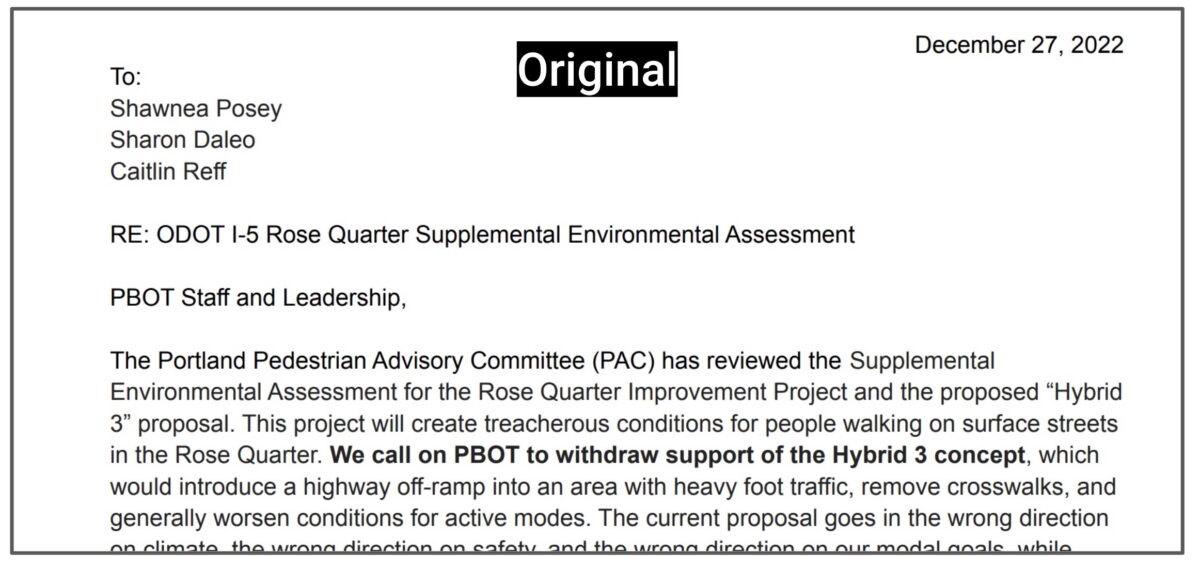

Often the most effective methods of influence available to the Portland Bureau of Transportation’s various modal advisory committees is to write letters. There are three modal committees — one for bicycling, one for walking, and one for freight and trucking — all of whom regularly write letters to elected officials and/or PBOT leadership to express positions on projects and policies.
Something very rare happened last week when the Pedestrian Advisory Committee (PAC) emailed a letter on the Oregon Department of Transportation’s I-5 Rose Quarter Project to PBOT staff (the letter would be included in PBOT’s official comment submission). A staff member, PBOT Rose Quarter Project Manager Sharon Daleo, wrote back. “Would the PAC be able to revise and resubmit… ?”
The request caught committee members off-guard. Not only was the timeframe for completing the letter very tight (just one week, right in the middle of holiday break), but the reason for Daleo’s concern raised eyebrows.
First, some context: The PAC was just one of dozens of local groups that sought to weigh in on the Oregon Department of Transportation’s controversial project that proposes a lid over I-5 through the Rose Quarter and an expansion to the freeway between I-84 and the Fremont Bridge. ODOT opened the official (federally-required) comment period for the Supplement Environmental Assessment on November 15th and the comment period closed yesterday, January 4th. The PAC first met to consider the letter on December 20th.
For their part, PBOT is in a very awkward position. A former commissioner-in-charge of PBOT disliked the project so much that in October 2020 she made the unprecedented move of issuing a stop work order and pulled the city out of the project entirely. PBOT didn’t officially re-engage with the project until this past summer when they were told by a different former commissioner that if they weren’t at the table, they’d be eaten for lunch (to paraphrase one of Jo Ann Hardesty’s favorite quotes, “You’re either at the table or you’re on the menu.”) While PBOT staff must support the project, opposition to it still runs very deep among among many Portlanders — including members of the PAC.
That strong opposition is what led to the language in the letter that made the PBOT project manager uncomfortable.
The original version of the PAC’s letter stated, in bold in its third sentence, “We call on PBOT to withdraw support of the Hybrid 3 concept,” and then continued without emphasis, “which would introduce a highway off-ramp into an area with heavy foot traffic, remove crosswalks, and generally worsen conditions for active modes.” They repeated this call to withdraw support in the final sentence of the three-page letter.
According to an email shared among committee members, Daleo said the call for PBOT to withdraw support was her “biggest concern” and she urged the committee to change that sentence. She said she hoped, “[the PAC] can adjust the wording to have more alignment and less inflammatory [language].”
“PAC members are pissed and the chairs of the committee have requested a debrief with Sharon to air our frustrations.”
– Committee member
As we reported in a story back in November, Daleo has already been working to tamp down concerns from constituents who are fearful of what ODOT might do to bicycling and walking conditions around the freeway. She tried to reassure PAC members of the value of PBOT’s continued involvement. “The only way we get these concerns resolved is if the City remains engaged in the project,” Daleo wrote in an exchange shared with the committee.
Daleo’s feedback on the letter sent committee members scrambling. One of them told me all but one of the members on the email exchange expressed frustration and concern about both the process and the timeline.
Reached for comment, PBOT Communications Director Hannah Schafer said she didn’t feel like it was problematic for a staff person to attempt to influence an advisory committee’s letter. Isn’t this like putting a thumb of the lever? I asked, “I don’t think it was putting a thumb on the lever,” Schafer replied. “It was staff trying to do their job of advising community members. I don’t think it was trying to silence anyone. We are not in the business of silencing committee members — that goes against fabric of our organization.”
Schafer said when the manager of a controversial project told volunteer committee members to change the wording of a specific passage in a letter that would be read by their partners at ODOT, “It was mean in the spirit of advice, which is the way we try to work with our committee members.” “We don’t decide what goes in that letter,” she continued. “We just advise.”
In the end, Daleo’s feedback did in fact help decide what went in the letter. Instead of a clear call for PBOT to withdraw its support of the project, the opening of the final letter states: “We call on PBOT to oppose the relocation of the I-5 SB off-ramp, closure of crosswalks, and other components of Hybrid 3 that will worsen conditions for active modes.” And instead of the final line saying, “We urge PBOT to withdraw its support of the Hybrid 3 concept,” it now says: “We urge PBOT to withdraw its support of the components of the Hybrid 3 concept that will worsen conditions for pedestrians and anyone else not in an automobile.”
Regardless of PBOT’s intent here, the episode has left a bad taste in the mouth of many committee members.
“PAC members are pissed and the chairs of the committee have requested a debrief with Sharon to air our frustrations,” one of them wrote in an email to BikePortland.


